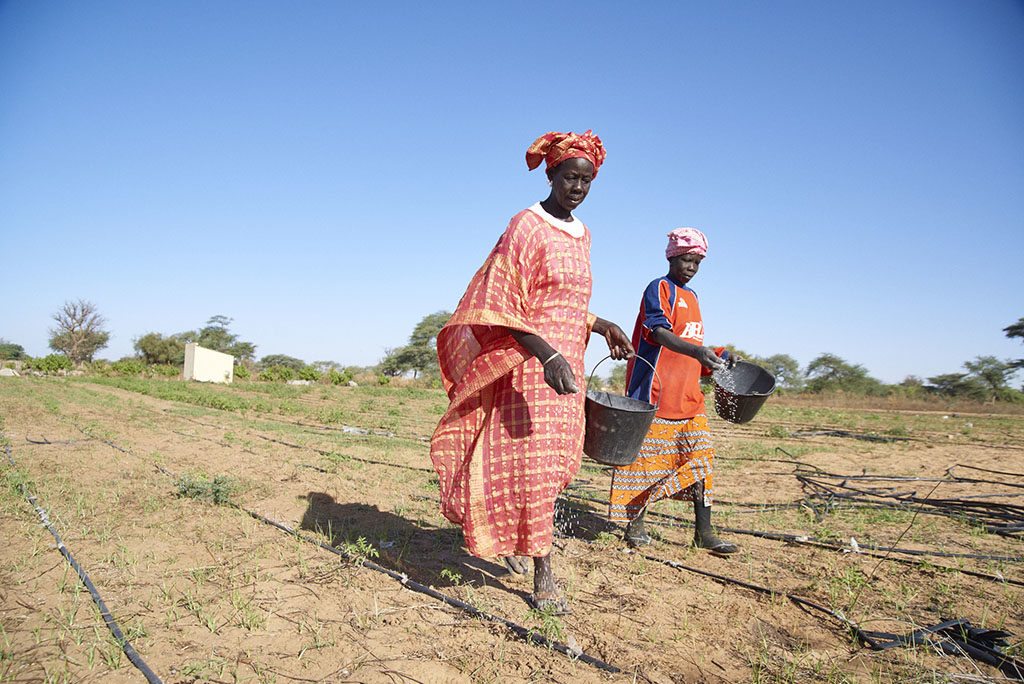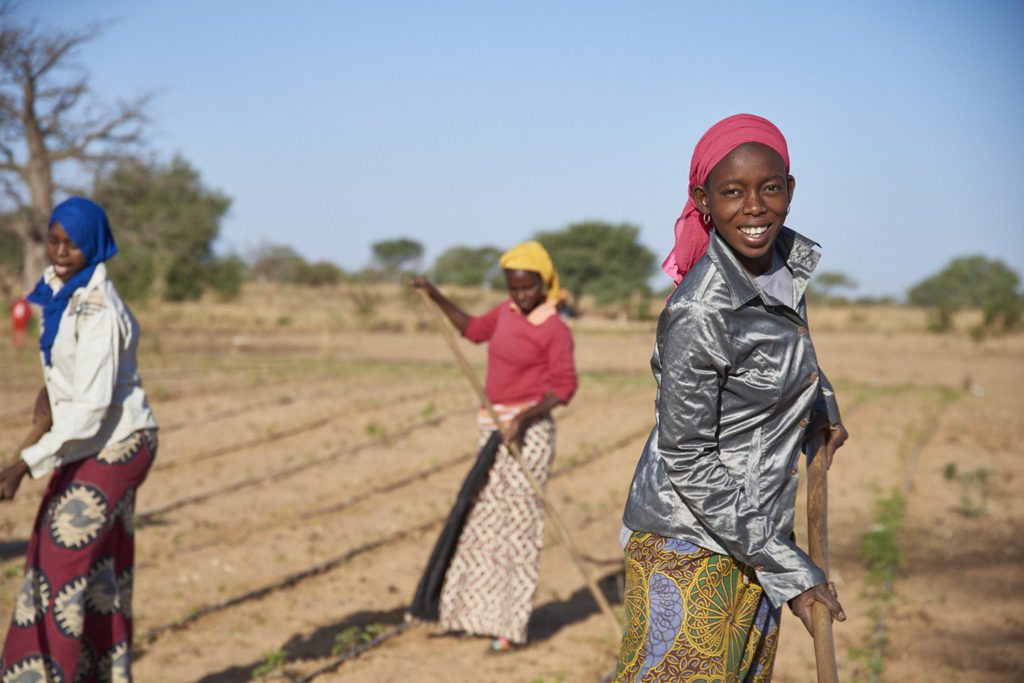Across Senegal, young people and women in rural communities are packing up their bags to look for jobs in cities. Though the agricultural sector supports more than half of Senegal’s population, a combination of factors has kept poverty rates in rural areas high. With local grain production covering only half of basic food needs, Senegal imports 70% of its food.
In 2013 the government of Senegal partnered with the Global Agriculture and Food Security Program (GAFSP) to strengthen the agricultural sector. Together they launched the Food Security Support Project (PASA) in three regions – Louga, Matam, and Kaffrine – to improve the food security and incomes of family farmers. Over the course of five and a half years, PASA reached more than 30,000 farmers and livestock breeders, 70% of whom were women.
Key findings on the implementation of PASA

Farmers Fatou and Maya scatter seeds at the farm collective in Ngaye Ndiawar village, Louga region [Sam Phelps/ActionAid]
The full report can be downloaded in French or in English.
Addressing external factors to boost agricultural production and market access
Farmers in each of the three regions had been growing a variety of crops prior to the project, but a combination of unfavorable weather conditions, high operating costs and limited infrastructure curbed their capacity to expand. PASA supported farmers to tackle these issues.
To combat strong winds and erosion, farmers converted previously unused lowlands into rice paddies. In just four years, the 3,910 rice farmers saw their yields nearly triple. Expanding the cultivation of rice, a staple in the Senegalese diet, has freed up farmers’ resources to invest in other priorities in their lives.
“We now have the resources to support expenses we previously couldn’t afford like education, health, and solid housing, as we no longer have to buy rice.”
– Yacine Fall, member of the DEGGO Group, Missirah Wadene Block, Kaffrine region
Reducing operating costs has also enabled farmers to invest more in food production. One of the farming cooperatives in the Louga region had been running a dairy business before, but high rent and electricity fees stunted its growth. Through PASA the farmers are seeing positive changes to their daily lives. Khady Sow, president of the Largal cooperative in Dahra, Louga region, says:
“The project relieved us by building us functional premises, by providing us equipment, pregnant heifers and other support. Now our standard of living has improved significantly. When we milk our dairy cows in the evening, the milk is partly consumed at home and partly sold locally. When we milk them in the morning, we deliver the milk to the cooperative, which gives us a payment every two weeks.”
As farmers addressed external factors like weather and rent to increase agricultural production, they also needed to bridge gaps in infrastructure to access markets. PASA supported the construction of roads that began to connect farmers to traders and buyers. Farmers also developed ways to bring their products to customers. They participated in and even organized urban fairs where they sold vegetables and rice. To strengthen their brand, a group of farmers created a local rice label called Ndoucoumane and a logo to go with it.
Dairy farmers also employed the strategy of going to where their customers were. With support from PASA they set up portable carts and kiosks near schools so that they could reach more children, who benefited from consuming the nutritious dairy products.
Mariama sells milk and yogurt at a kiosk funded by her farming group’s profits, with supported from PASA. [Sam Phelps/ActionAid]
Improving working conditions for women farmers
The number of women participating in PASA exceeded expectations. In addition to improving their incomes, PASA helped reduce women’s workload by building new wells and restoring existing wells.
“Before the project, we spent a good part of the night in search of water. Now this constraint is removed.”
– Rouguy Sow, member of the pastoral unit of Labardi, Louga region
For some women, the expansion of rice growing meant improved working conditions because they no longer had to risk their safety selling charcoal along the busy main road. Now they could focus on growing rice as well as vegetables and see greater returns – without worrying about getting hit by cars.
Overall participating in the project encouraged more women to raise their visibility within their communities. Rouguy said:
“In the recent past, we didn’t even dare to approach meeting places. Now we participate in all the meetings that are held in the village.”
Involving civil society in decision-making
Undertaking a project of this scale required input from local community members at every phase. Women were encouraged to participate – both individually and collectively – in decision-making around project implementation. From identifying project participants to managing construction projects to monitoring implementation, PASA solicited the expertise and involvement of women farmers and their associations.
Despite the involvement of project participants in decision-making, our study found that the structure of these groups wasn’t sustainable. One-off committees created just for project implementation tend to collapse after a project ends. The sustainability of project outcomes would have been better guaranteed if PASA had reinforced existing organizations rather than form new ones.
Developing infrastructure and techniques to tackle climate change
Water management is really important for Assane and his farmers’ group who grow lettuce [Sam Phelps/ActionAid]
Discussions continue about how to increase farmers’ access to these seeds while sustaining their financial and technical autonomy.
Recommendations
At the time of this study, PASA was on track to delivering its remaining activities. To sustain the improvements made to food security and nutrition, our study made the following recommendations:
- Strengthen existing local organizations rather than creating specific structures for project implementation
- Support contractualization between producers and traders to ensure sustainable and profitable markets for production
- Prepare a gender-specific assessment of the project’s impact on women
- Develop training programs for young people to create employment opportunities and encourage their engagement in decision-making
- Promote water and soil conservation (to combat erosion), solar energy (to combat high electricity bills) and seed multiplication programs (to promote crop diversity)
- Set up and implement a plan to maintain the roads, boreholes and other infrastructure built by the project

